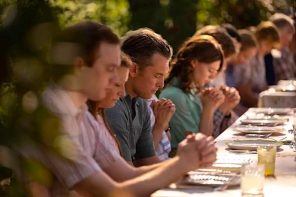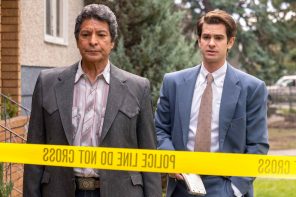Woody Allen’s new movie, Magic in the Moonlight, is loosely based on a story that’s almost too good to be true: Harry Houdini, master magician, for many years used his celebrity to debunk spiritualists who claimed to communicate with the dead, who were, unsurprisingly, enjoying a resurgence after World War I. Exposing several as frauds, he ended their lucrative careers bilking grieving loved ones out of cash.
It would seem like someone who makes his living out of a certain suspension of disbelief would be an odd choice as a debunker. But Houdini didn’t see it that way. Defying the laws of physics was a human skill. But defying the existence of death was just plain bunk. So he advocated for magic as a profession, with training and gravitas, and making no supernatural claims. The fake-er the spiritualists were, the real-er Houdini the magician was.
Houdini makes a fine model for the classic skeptic-nebbish character that can be found in all Woody Allen’s movies, for years played by Allen himself, and recently by various more-talented stand-ins, in this case Colin Firth, as Stanley Crawford, aka the great conjurer Wei Ling Soo. It is somehow harder to believe this particular nebbish’s gripes about life being “nasty, brutish and short” when he’s lured to the south of France to expose the inevitable fraudulence of the young American medium, Sophie Baker (Emma Stone). Then the tables, of course, are turned.
As Crawford begins to contemplate the possibility of Baker and her “unseen world” of spirits being authentic, he and his friends discuss the seriousness of the implications (while dolled up in flapper wear at a hot jazz club). It would mean that life is not horrible, because death is not final. It means that life “has meaning,” or even, says a deadpan woman “that God exists.” Awkward pause, Crawford chimes in: “Well let’s not go that far!” But the movie does proceed to go that far.
Stanley’s Aunt Vanessa (Eileen Atkins), by far the most charming character in the film, gets to be the mouthpiece for its message: “The world may or may not be a world of purpose, but it does contain a little bit of magic.” I know it’s just a romantic comedy, but I couldn’t help being a little disappointed. I guess I just don’t see what purpose and magic have to do with one another.
If Sophie could really contact an unseen world of souls of the dead, it would certainly make death less final. But how would it make meaning out of this life? And what does God have to do with it?
There are, of course, many religious traditions worldwide for which communicating with invisible spirits of some kind is a mainstay. Houdini would have had a hard time with the example of Quesalid, a shamanic healer who sucks the “spirit” of the disease; anthropologist Claude Levi-Strauss knows the “spirit” is fake, but the healing seems to work. Anyway, the unseen world is presumed to exist, just out of sight, and certain people have the power to make it seen. Spirits can be reached out to as a source of wisdom, maybe sort of like the Internet. And like the Internet, the unseen world doesn’t necessarily imply the existence of a singular God, or even make death any less final.
My favorite recent incarnation of the real-magic-vs-fake-magic story takes a similar attitude. Deadbeat, a Hulu TV series, doesn’t have the pomp and Provence of Magic in the Moonlight. Instead it’s a sly spiritualist sleeper hit for the Internet age, sort of a combination of Medium’s workaday quality and Psych’s playfulness. The protagonist Kevin Pacalioglu (Tyler Labine) is an unemployed underdog, much easier to root for than self-important Houdini or uber-serious Stanley Crawford.
Yeah, his dead-communicating talents haven’t really paid off. That doesn’t seem to bother him—his friend who believes in him gets him the occasional gig, for cash. He starts working out of a street-side newsstand, perhaps the best medium cover ever. He doesn’t require dim lights and mystical chants to become possessed by the dead person in question—he empties himself out to make room for the spirit by having his clients bore him with incessant talk, or taking hallucinogenic mushrooms.
And life is good until he meets the fake medium, Camomile White (Cat Deeley), a bestselling author who gives a talk at a nearby bookstore. I won’t spoil it for you, except to say that ectoplasm has something to do with a blueberry Slushy. Hilarity—but no debate about the existence of God—ensues.





